Matt Damon The Bourne Ultimatum Interview
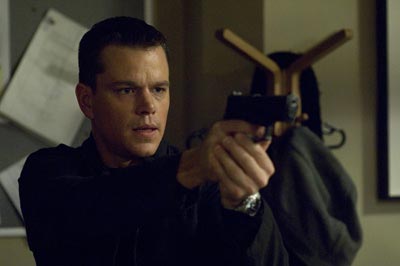
DAMON NOT BOURNE YESTERDAY.
Matt Damon -The Bourne Ultimatum Interview by Paul Fischer.Matt Damon is a youthful 37, as affable and charming as he was when he first burst on the screen over a decade ago. Damon is back what is likely to be the final chapter in the search for who is Jason Bourne? In this far ranging chat, a very talkative Damon talks Bourne Ultimatum, success and fatherhood.
Paul Fischer: You've said it before that you're not going to be playing Jason Bourne ever again, and secondly what did you learn from three years playing this coldly efficient amnesiac killer?
Matt Damon: Starting with the easy one, I made that comment at Cannes when we were about nine months into shooting the movie (he laughs), I just went, 'I'm never doing this again.' But I think in terms of another one, the story of this guy's search for his identity is over, because he's got all the answers, so there's no way we can trot out the same character, and so much of what makes him interesting is that internal struggle that was happening for him, am I a good guy, am I a bad guy, what is the secret behind my identity, what am I blocking out, why am I remembering these disturbing images? So all of that internal propulsive mechanism that drives the character is not there, so if there was to be another one then it would have to be a complete reconfiguration, you know, where do you go from there? For me I kind of feel like the story that we set out to tell is has now been told. I love the character, and if Paul Greengrass calls me in ten years and says, 'Now we can do it, because it's been ten years and I have a way to bring him back,' then there's a world in which I can go, 'Yeah, absolutely.' We could get the band back together if there was a great idea behind it, but in terms of now and this story, that part - the story's been told, if we came out with a fourth one, suddenly I got bonked on the head, you guys would be like, 'Are you kidding me?' Actually, I was talking to a journalist yesterday, who suggested that we could the fourth one about Bourne losing his keys. And we could do for the entire movie, 'Where are my keys?' And that kind of illustrates how out of story we are at this point in terms of what was good about these first three films.
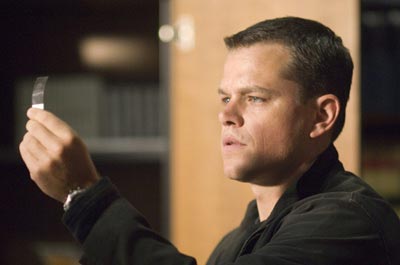 And in terms of playing the character, it's been seven years really for me, the movies have come out over the course of five, but it's been seven years of my life coming back to the - there hasn't been a role that's had a bigger impact on my life, maybe Good Will Hunting did because it pulled Ben and I out of total obscurity, but in terms of having an impact on my career - just as an example, between Supremacy and this one, Bourne Ultimatum, there were three movies that I really wanted to do, because I loved the scripts to three movies in particular, all of these movies were on the face of them going to be absolute box office misses, and they were Syriana, which was a very complicated movie and George and I cut all our money so we could do it, and The Departed, which now looking back obviously was this big hit and it won all the awards, but at the time if you took a Scorsese movie, his movies classically don't make a lot of money, even the masterpieces, Goodfellas, Raging Bull, they don't actually make a lot of money at the box office.
And in terms of playing the character, it's been seven years really for me, the movies have come out over the course of five, but it's been seven years of my life coming back to the - there hasn't been a role that's had a bigger impact on my life, maybe Good Will Hunting did because it pulled Ben and I out of total obscurity, but in terms of having an impact on my career - just as an example, between Supremacy and this one, Bourne Ultimatum, there were three movies that I really wanted to do, because I loved the scripts to three movies in particular, all of these movies were on the face of them going to be absolute box office misses, and they were Syriana, which was a very complicated movie and George and I cut all our money so we could do it, and The Departed, which now looking back obviously was this big hit and it won all the awards, but at the time if you took a Scorsese movie, his movies classically don't make a lot of money, even the masterpieces, Goodfellas, Raging Bull, they don't actually make a lot of money at the box office.It's this incredible experience because you're working with him, which is why he can get any actor he wants, everyone will cut their fee and go and work with Marty, but in terms of looking at your career, you go, 'Well, okay, so that's number two. That'll be two movies in a row that I'm in that don't perform at the box office.' And then I fell in love with the script called The Good Shepherd, and everyone went, 'Look, this is a tiny, little bull's eye you're aiming at here,' and you look at it and you go, it's a very tense, cerebral, historical epic about the birth of the Intelligence Service in America. It's not Spider-Man 3. But I didn't hesitate because I loved all the scripts and they were movies that I desperately wanted to do, and I knew that I had The Bourne Ultimatum off in the middle distance, and that there was going to be an audience that was built in for that. So it really just allowed me creatively freedom to make all these movies, which each individually, I'm just so happy - I'm proud of each of those movies, they all did very well, some of them did incredibly well, and they were all reviewed really well, so they all just made a big impact on my career. So that's like an ancillary way that the Bourne character has completely changed my life. Starting with the first one, where nobody had offered me a movie in six month and I was in London doing a play in the West End, and the movie opened, and by that Monday I had twenty offers, so that was where - I would have been thirty-two years old, or thirty-one years old, the rose colored lenses came off, I went, 'Okay, I get it.' If you're in a hit you have a career, and if you're not it doesn't matter, they might think you're a real nice guy; they're not hanging a movie on you.
Paul Fischer: Seeing this movie with an audience, people cheer when you're kicking ass and crashing cars, how does it feel to be that kind of a crowd pleaser with these violent acts?
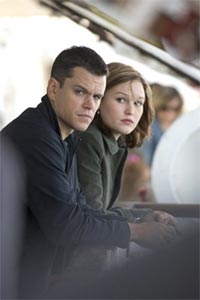
 Matt Damon: It feels so good I can't even tell you. In fact, you guys were the second audience to see the movie, so none of us have seen it with an audience. So two nights ago, when the first press screening happened, we were all getting Blackberried during the movie, 'They're cheering at Waterloo,' because we didn't know, we came so down to the wire, as we always do on these Bourne movies, that we didn't even get a test in, so we had shown it to - we each had little DVDs, we showed it on television, I showed it to my wife, I showed it do my brother, he was like, 'Yeah, cool.' And so we'd have these little friends and family screenings, Paul showed it to twenty-five people, you know, people in the business that we know that make movies, 'Are we missing anything, guys? Can you help us out?' Collecting notes as quickly as we could and trying to get them into the edit, and then putting it out. So two audiences have seen the movie, of which you guys are the second, so to hear that - last night we were at dinner, we got the Blackberrys all started going off at the same time, and we heard that it was a crowd pleaser again. It was Paul and George Nolfi, the writer, and me and Joan and David Strathairn and Julia so we just told Amanda to expect a hung over group coming in the next day, because that's when the champagne came out.
Matt Damon: It feels so good I can't even tell you. In fact, you guys were the second audience to see the movie, so none of us have seen it with an audience. So two nights ago, when the first press screening happened, we were all getting Blackberried during the movie, 'They're cheering at Waterloo,' because we didn't know, we came so down to the wire, as we always do on these Bourne movies, that we didn't even get a test in, so we had shown it to - we each had little DVDs, we showed it on television, I showed it to my wife, I showed it do my brother, he was like, 'Yeah, cool.' And so we'd have these little friends and family screenings, Paul showed it to twenty-five people, you know, people in the business that we know that make movies, 'Are we missing anything, guys? Can you help us out?' Collecting notes as quickly as we could and trying to get them into the edit, and then putting it out. So two audiences have seen the movie, of which you guys are the second, so to hear that - last night we were at dinner, we got the Blackberrys all started going off at the same time, and we heard that it was a crowd pleaser again. It was Paul and George Nolfi, the writer, and me and Joan and David Strathairn and Julia so we just told Amanda to expect a hung over group coming in the next day, because that's when the champagne came out.Paul Fischer: It's rather a chilling comment on government intrusiveness, is this film more timely now than the first one? And I understand you and your better half are writing another script together, how's that going and can you talk about your relationship with what's-his-name?
Matt Damon: Well, all the movies I think are very much of the time that they - the first one is very much a 2002, it's a post 9/11, all of the fear, all of the paranoia, everything in there, what I love about them is that you'll be able to look back and know the second one is 2004, things are starting to turn in Iraq and now this kind of American guy, this iconic American figure is going and apologizing and atoning for his misdeeds, for things that he's done, he's taking responsibility. Now you have the movie ending where Bourne is pulling the gun and putting it to the head of the person who lied to him, who said, 'This is what you're going to be doing, you're going to be saving American lives,' and Bourne's saying, 'I seen now that you led me into something under false pretences, and now I understand that and I'm not going to do that anymore.' And so each movie is very much a reflection of the time in which it's made. We obviously have all the images of water boarding, of somebody getting shot in the corner of the room who Bourne doesn't even know what he did, he asks what did he do? He's told, 'We've been through that; you can't know that.' So there's somebody who's an American who's killed without a trial, so all of these things are just little kind of nods to the world that we're living in right now. And I like that about them, they feel relevant, Bourne has a lot of integrity, I do think he's very kind of American character, I like that about him, his thoughtfulness, his intelligence, the fact that he's trying to do the right thing, doesn't always do the right thing or his misled, but is trying to do the right thing. So those things I think are great.
In terms of my hetero-life-mate, I think Kevin Smith once said in one of his movies; we're not working on a script right now, but we're talking about a bunch of different things. His career just totally has gone in this really new and exciting direction, because I've seen the movie that he directed and it is really good, it's fantastic, the performances are great and every actor is going to want to work with him after they see this thing. It's coming out in October and it's done, I mean he's finished, so they're just waiting for the proper release date to bring it out, which I think is somewhere - I think they're doing it around the time The Departed came out. So he's gone from being an actor to now being a director, now being somebody that can give me a job, so our whole relationship's completely changed.
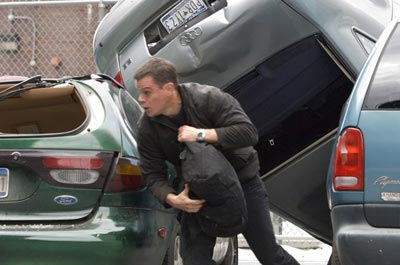 Paul Fischer: Would you like to be directed by him?
Paul Fischer: Would you like to be directed by him?Matt Damon: I would love to, so now that's a new dynamic that our partnership can have, we can do a movie that we act in, or I act in and he directs, or something that we co-direct, or something that co-write and co-direct, there are so many different possibilities now because he's gone and done this really great movie. So it's exciting and now we've started to talk about that stuff again, it's been ten years since the last one and we both put our heads down and worked pretty hard in this last ten years, and so now we've woken up with careers and families and all the things that we wanted, and so hopefully the next ten years will be about doing better work, maybe doing a little less of it, but doing better stuff and doing more together.
Paul Fischer: What's your favorite action sequence in this, and was there a sequence in Washington outdoors in the mall that you shot that didn't make it into the film?
Matt Damon: I'll do the second part first. Joanie and I have shot over the course of the last two movies, probably - we were talking about it and laughing about it at dinner last night, probably eight scenes, Joan Allen and I have shot, probably three or four in Supremacy and three or four in this one, where it's a weird thing, we make these movies are changing in such a fluid - it's a really weird process, and we'll end up doing scenes and we'll just be sitting there shooting and going, 'Well, this is never going to be in the movie. This doesn't work at all.' But a lot of that we don't know until we get them up on their feet, and so as a result Joan and I have done a number of scenes together, all of which are on - I mean, you could make a DVD of - we've done the same scene in all these different locations and finally what we ended up with is that little quick scene outside the hospital in New York where I give her the thing, it's kind of a good indicator, it's kind of the way - like the amount of attrition, like the attrition rate, like we shoot - our ratio of scenes shot, the scenes that make the movie are probably like that, about eight to one. That's what happens when you start without a script.
Paul Fischer: And your favorite action sequence?
Matt Damon: Well, I always liked the Tangier sequence and the running along the roof because it's just Bourne absolutely a hundred miles an hour flat out, and I always liked him grabbing the things, all the things we came up with when we were on the real location, that's the fun stuff, because you get a bunch of guys together and you're going, 'Alright, what would be the smart thing to do here?' And we'd kind of figure out those sequences, and when they cut them together and they actually work it's really a good feeling. Although Paul came up with Waterloo, that was all Paul's design and what would it be like to have a guy leading a complete novice through, to try to allude - and that was all Paul and I love that sequence too, (under his breath) and the car chase too.
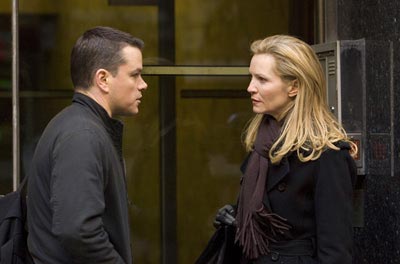 Paul Fischer: How did you deal with the David Webb backstory? And will you do more narration work? You have a great voice.
Paul Fischer: How did you deal with the David Webb backstory? And will you do more narration work? You have a great voice. Matt Damon: Thank you. [in a high voice] "Huh, what'd you say?" Yeah, well, we always kind of had a feeling about kind of where the Bourne character came from, and that he would have been trained, that he would have had a military background. Presumably he was tapped from one of these programs as a good candidate and showed language skills. You know, we had a kind of a loose idea of what that backstory was. We didn't want to pin anything too far down because obviously making all three movies, we never really knew. But we definitely knew enough that I could do all the physical stuff and get ready so that the character was kind of, hopefully, believable. And in terms of narration, I'm going to narrate a movie called Running the Sahara, which we produced. It's about these three ultra-marathoners. It's a documentary. They ran across the Sahara Desert last year, about 50 miles every day. Yeah, three guys from three different countries. And it's a movie about that expedition and also what happened to them on the run, and how they became aware of a lot of issues, particularly the water crisis in Africa. So that's going to be at the Toronto Film Festival this year.
Paul Fischer: Did you get hurt at all doing any of the stunts? And what's your update on fatherhood?
Matt Damon: Well, the fighting stuff, yeah, there was a huge difference. The first movie, I was 29, and this last one, I was 36, and I definitely felt my age. And particularly because that big fight scene in Tangier, Joey, the other actor, the guy that I'm fighting, is like 23 years old. The first movie came out and he was in high school. And so he was so happy. He was like, "Mate, I'm in a Bourne fight, this is great!" And he is in really good shape, and he's already like a much better athlete than me. So I was like, "Oh, man, Joey, you're killing me! You gotta slow down." And so I think it took probably a couple extra days. You know, it probably cost the studio a couple extra days because I'm a little older now.
Paul Fischer: Did he really go for you?
Matt Damon: No, I mean, he just was so excited, and I couldn't possibly defend myself against him. [laughs] So he'd be like, "Dude, just like three moves at a time. Come on." So he was a good sport about it though. He did a great job.
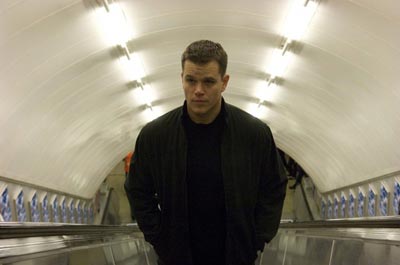 Paul Fischer: And being a dad?
Paul Fischer: And being a dad? Matt Damon: Being a dad is still great. It's been just amazing. I mean, these stages just go by at such a...I mean, it's like it's incredibly fast, you know? The little discoveries every day, so much is happening, so much changes, in the first year that...I mean, she's walking around now. She's 13 months old, so it's just amazing. It happens at warp speed. I see why people, when parents see little babies, they get that thing, they go, "I want another one," Because the stages all just fly past. And if you're with her every day, which I'm lucky enough to be...You know, it's only if you're taking pictures or it's only if people you haven't seen for a couple months, that you even realize, because it's just...It's happening in front of you, and you don't even see it.
Paul Fischer: Do you have it figured out?
Matt Damon: Well, I try to figure out what it is...I mean, right now, she kind of sounds like a crow. She kind of goes like [makes crow sound twice]. Like that. And points at things. And this morning, like she pointed at the ceiling, and there was nothing on the ceiling. And she just went [makes crow sound] like that. And I was like, "Well, that's the ceiling." And she went [makes silly laugh]. And I was like, "I don't know what's funny about that." So I'm trying to figure out what's going on in her head. Like sometimes you know. Sometimes she goes [makes crow sound] and you go, "Oh, you want some milk?" And she goes [makes silly laugh]. And you go, "All right, she was thirsty. That's good, she communicated." But then sometimes she just has these things that I just have no idea what she's thinking. So I'm working on that.
Paul Fischer: How did Paul's background make your working relationship easier, and what kind of relationship do you have with him in shaping the film?
Matt Damon: Yeah, he's the guy that I do that with because he's so great at that. And he's also a terrific writer. You know, I mean, he wrote United 93, he rote Bloody Sunday. He's a really good writer. And he does a significant amount of the work on these movies, too. Which any director does. I mean, you have to take ownership. You're telling a story, even if someone else has written it, you have to tell the story in a way that makes sense for you. So every director working, every director worth his salt is a pretty good writer, too. They never take credit for it, unless it's just them doing it, but...You know, generally, that's what the writer's there for. And we were lucky enough to have George Nolfi on set with us every day. So George kept out ahead of us. He would literally be in his hotel room working on the pages for the next day while we were working on the pages he had given us for this day, and we were making our tweaks in the real location, going, "Okay, well let's change this to that, because that thing's over there." You know, it's not an advisable way to make a movie. Like you couldn't teach that in film school and send people out there. But it works for Paul. And there's something about the chaos and the alchemy of like Frank Marshall and Paul Greengrass. And in this case, we had three different guys working on the script: Tony Gilroy, Scott Burns, and George Nolfi, who were on at different stages, and who are three of the best writers working today. So it's like you get this big mix and then you get the actors in there. But they've all gone down to the 11th hour. And we've literally [haven't known?] until two nights ago. So it should come with a stamp. It's not an advisable way to work if you want to live a long life.

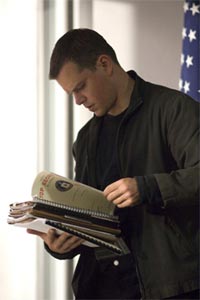 Paul Fischer: Would you consider doing another franchise character? And what do you want to be known for at the end of the day?
Paul Fischer: Would you consider doing another franchise character? And what do you want to be known for at the end of the day? Matt Damon: So would I, with the Bourne character, would I do three more Bourne movies, do you mean?
Paul Fischer: Not Bourne, another character.
Matt Damon: I'm trying to only do franchises. That's my new thing. In fact, when the guys who wrote Ocean's Thirteen wrote the movie Rounders, and I said to them...Because Rounders was a bomb when it came out, but now it's done really well on video. And I said, "You guys are writing the wrong sequel. We should be doing Rounders 2!" [laughs] So no, I'm open to...You know, in each case, with both Bourne...And I know Ludlum had written three books, but I signed up for one, and they were okay with that. And then when I signed up for the second one, I didn't sign up for the third, I only signed up for one again because I wanted to make sure that it went well and I still liked doing it. And so I've done it. And the Ocean's movies have just...You know, Steven calls and goes, "We're doing another one" and I go, "Okay, I'm in." But there was never a kind of an eye to being, for me, for either of them being franchises. I don't think that way. And so I'm open to any good movie. If I enjoy the experience and I love the people I'm working with and I feel like there's a chance to make a good movie, I'll make it if it's a sequel or if it's not.
Paul Fischer: At the end of the day, what do you want to be known for?
Matt Damon: Well, you know...The career that I think Ben and I look at...Well, Clooney's definitely doing it right now, and Clint Eastwood. Those are the careers where they're acting, they're writing, they're directing, and they're doing it on their terms. I mean, I think that's the biggest. I love making movies, and I love everything about it. And I love writing and I love acting, and I really want to direct. And I've been taking this last ten years to really carefully study these directors that I've been working with. And I've worked with a lot of really good ones at this point. And so I feel like I'm ready to do it. And that, to me, would be great to have a long career. I mean, it's so hard to have a long career in this business. I mean, you guys see people just...I mean, I'm still here after 10 years, and we're all probably a little amazed by that. [laughs] But yeah, so at this point, I just want to just be smart about the work that I'm doing and try to have integrity about the choices I make, and that's it.
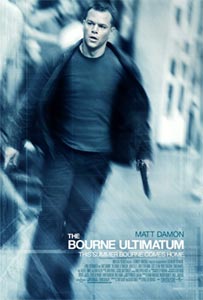
The Bourne Ultimatum
Starring: Matt Damon, Julia Stiles, Joan Allen, Edgar Ramirez, David Strathairn, Paddy Considine, Albert FinneyDirector: Paul Greengrass
Matt Damon returns as the trained assassin Jason Bourne for the latest showdown in The Bourne Ultimatum. In the follow-up to 2002's The Bourne Identity and 2004's The Bourne Supremacy--the smash hits that have earned over $500 million at the global box office--acclaimed director Paul Greengrass (United 93, The Bourne Supremacy) joins returning cast members Julia Stiles and Joan Allen and new additions David Strathairn, Paddy Considine and Edgar Ramirez.
All he wanted was to disappear. Instead, Jason Bourne is now hunted by the people who made him what he is. Having lost his memory and the one person he loved, he is undeterred by the barrage of bullets and a new generation of highly-trained killers. Bourne has only one objective: to go back to the beginning and find out who he was.
Now, in the new chapter of this espionage series, Bourne will hunt down his past in order to find a future. He must travel from Moscow, Paris, Madrid and London to Tangier and New York City as he continues his quest to find the real Jason Bourne--all the while trying to outmaneuver the scores of cops, federal officers and Interpol agents with him in their crosshairs.
The Bourne Ultimatum will be shot in Morocco, Spain, France, the United Kingdom and the United States.
Review: By far the best Bourne yet, you know you've seen a great movie when you come out excited about what might come next. A complete story, that leaves room for another. Plenty of action and realistic drama, although I think Bourne is bordering on Superhuman the way he recovers.
Interview with Matt Damon - The Bourne Supremacy www.femail.com.au/matt_damon_the_bourne_supremacy_pf.htm
Interview with Matt Damon - The Bourne Identity www.femail.com.au/mattdamon.htm
Interview with Franka Potente The Bourne Identity www.femail.com.au/franka_potente_bourne_identity.htm
Interview with Paul Greengrass - The Bourne Ultimatum www.femail.com.au/paul-greengrass-the-bourne-ultimatum.htm
Review The Bourne Identity www.girl.com.au/the_bourne_supremacy_review.htm
Order Now from Chaos
Order Now from Sanity
MORE
- Viggo Mortensen The Road
- 24 Cast Reunion
- Aaron Eckhardt No Reservations
- Aaron Eckhart The Dark Knight
- Adam McKay Step Brothers Interview
- Alan Alda Diminished Capacity Interview
- Alan Alda Diminished Capacity Interview
- Alex Dimitriades
- Al Pacino Oceans 13
- Alan Rickman Snow Cake
- Alan Rickman Sweeney Todd



